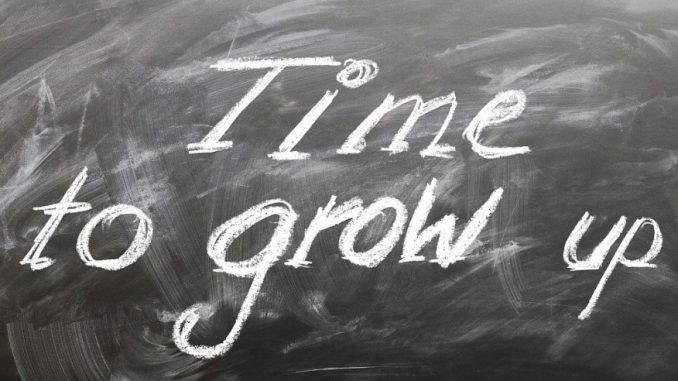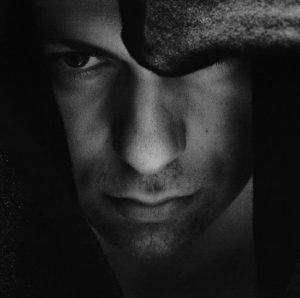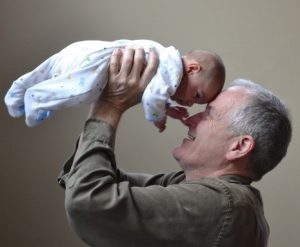
Opening Insights: The Millennial Struggle
My mentor, who I’ll refer to as my Co-Lab Grandpa (A Grandpa’s Blog) , recently asked me to do a brief write-up regarding what it’s like to be a Millennial. What an interesting request. That’s similar to asking a dog, “Hey Bruno, what’s it like being a dog?” The question is met with an immediate retraction of the tongue, eyes become slightly more focused on you, ears up and head subtly tilted to one side. As if to say, “Huh? Whachoo talkin’ ‘bout?”
, recently asked me to do a brief write-up regarding what it’s like to be a Millennial. What an interesting request. That’s similar to asking a dog, “Hey Bruno, what’s it like being a dog?” The question is met with an immediate retraction of the tongue, eyes become slightly more focused on you, ears up and head subtly tilted to one side. As if to say, “Huh? Whachoo talkin’ ‘bout?”
I was born in 1982 to parents that reached adulthood in the 1960’s. Saying that they grew up, or referring to them as adults, is simply stretching the truth. Although they reached an age of physical maturity, they were never taught how to grow up. Their parents were born in a time that knew struggle, strife, hard work and eventually, prosperity. Their parents went through a lot, knew loss and had to sacrifice and work tremendously hard to make it. They swore to themselves they would provide for their children, so they wouldn’t have to endure the same hardships of life.
Little did they know, those hardships, losses, struggles and challenges were the gauntlet that shaped them and forged them into the Greatest Generation. Without a way for wisdom from experience to be passed down the line, and without a gauntlet of their own, the Baby Boomers never learned how to grow up, and so they lacked the ability to teach their children how to grow up. That is how Millennials were born.
Informational Insights:
Can’t Hear, Already Know, Don’t Care
Because of our prosperity as a nation and our free enterprise system based on competition, brilliant American minds were free to develop the technology revolution. The digital marketplace emerged  with widespread use of computers and the digitization of data. All the knowledge of the world soon became widely accessible through the internet, a limitless tool of communication that abruptly, and drastically, shrunk our planet. Soon after the internet emerged came the smartphone, which mixes all technologies into a pocket-sized Lifestyle Companion that goes wherever the owner does and makes all the knowledge of the world accessible through voice command. What a powerful resource!
with widespread use of computers and the digitization of data. All the knowledge of the world soon became widely accessible through the internet, a limitless tool of communication that abruptly, and drastically, shrunk our planet. Soon after the internet emerged came the smartphone, which mixes all technologies into a pocket-sized Lifestyle Companion that goes wherever the owner does and makes all the knowledge of the world accessible through voice command. What a powerful resource!
Often termed as the Spider-Man Principle, the following statement applies perfectly, “With great power there must also come – – great responsibility.” Combine that with another popular phrase, “Knowledge is power” and now we have reached a core element of the Millennial Struggle.
Consider what would happen if you granted an 18-month-old absolute power. The toddler is an entity composed purely of feelings and has not yet learned how to deal with life nor established that actions have consequences. It’s a confusing time where the little person is transitioning from having every want and need provided for them, to a position of increased mobility, responsibility and accountability.
 Granted absolute power, the toddler would banish anything unpleasant from existence and pull whatever fantasy that tickled the imagination into being. When there is no authority (can I?), no responsibility (should I?) and no accountability (what did I learn?) then there is nothing stopping them from doing whatever their emotions based on feelings tell them. Surely, and almost instantly, the toddler would end the world as we know it.
Granted absolute power, the toddler would banish anything unpleasant from existence and pull whatever fantasy that tickled the imagination into being. When there is no authority (can I?), no responsibility (should I?) and no accountability (what did I learn?) then there is nothing stopping them from doing whatever their emotions based on feelings tell them. Surely, and almost instantly, the toddler would end the world as we know it.
It is not so different with Millennials. We are granted immense power by our ability to summon the knowledge of the world without effort. Like the toddler in the example above, we were never taught how to grow up. We lack self-authority, self-responsibility and self-accountability. So, what do we do with all that power? We react to our feelings and feed our emotions.
Because we have all the knowledge of the world available freely, and at our fingertips, we can’t hear when somebody attempts to teach, mentor or pass on wisdom. “What the hell do they know!? I found the answer already online!” Millennials are almost 100% dependent on the internet to acquire knowledge and are largely unfamiliar with experiential learning. Also, because knowledge is widely accessible, and practically free, they have no respect nor understanding for how it was acquired in the first place, or for its true value.

How can you learn when you can’t hear what anyone else says to you? Millennials don’t need to learn from anyone else because they already know the answer. They often know the answer before the question is even asked. If they don’t know the answer they will pretend they do and hope nobody finds out. Even if there was a mentoring and learning system introduced to help Millennials grow up, they wouldn’t take part. They don’t need to. They already know what they need to know, and as soon as they know, they stop listening (can’t hear).
I Don’t Care
Going back to Knowledge is Power, the internet was introduced as the ultimate information resource. It is the center of tremendous power. What happens when the information on the internet is adjusted to suit the aims of those who understand the premier market, Millennials? If you understand that the Millennial is a being driven purely by feelings, like the toddler, then you could conceivably coerce whatever emotion was necessary to create the desired reaction. This is like having the power to control the ocean tides, or the weather, or the intensity of the sun. It’s just too much power for any person to wield.
you could conceivably coerce whatever emotion was necessary to create the desired reaction. This is like having the power to control the ocean tides, or the weather, or the intensity of the sun. It’s just too much power for any person to wield.
Nearly all men can stand adversity,
but if you want to test a man’s character,
give him power.
ABRAHAM LINCOLN
What results is a generation of individuals who are jacked-in to an all-powerful resource that is feeding off of them instead of nurturing their individual intellect. This generation never grew up, never had to, and never learned about the consequences of their actions. Because they are so out of control of their own emotions, of their assets, of their relationships, of their development, of their thinking, they are pummeled by enormous amounts of fear.
One of the best examples of fear-based control is the Catholic Church. It has ruled over a large portion of mankind for millennia through fear. Your eternal soul will face eternal damnation if you don’t…
 Fear causes the same response in the brain as being physically hurt, and when we’re being physically hurt the only thing on our minds is how to make the pain stop. Thinking stops, reaction takes over. It’s a survival adaptation. What do you do when you can’t stop the fear/pain? You stop feeling and slip into a state of apathy. I don’t care.
Fear causes the same response in the brain as being physically hurt, and when we’re being physically hurt the only thing on our minds is how to make the pain stop. Thinking stops, reaction takes over. It’s a survival adaptation. What do you do when you can’t stop the fear/pain? You stop feeling and slip into a state of apathy. I don’t care.
Combine the three attitudes (Can’t Hear, Already Know, Don’t Care) and what do you get? Social Engineering. Millennials are slaves to our feelings and emotions. If you know how to control our feelings and emotions, we become your slaves. No shackles or chains are necessary, we are bound within our very minds. We are in a cage with the door open, but we do not leave. We are hurt and tormented, but we do not choose another way. We are stripped of our identity, freedom, personal power and self-authority, but we choose to get ANGRY at the world, rather than DO SOMETHING about it.
The 5 Basic Needs
We enter a state of fear when our basic needs are not met, and remain there until they are. Our basic needs are comprised of:
- Survival – knowing that we will physically survive (food, shelter, safety)
- Freedom – knowing that we are free to pursue any of life’s pathways
- Usefulness – knowing that we have a value to others, that we contribute to overall well-being
- Love – to love, and to be loved, which is the combination of Attention, Respect and Appreciation
- Self-Identity – knowing who you are, being able to trust yourself, possessing individual boundaries
Survival, why do you think Millennials and the newer generation are so dead-set on having an absolute-control government? It’s because they are afraid for their own survival. They know they can’t provide for themselves and want to be certain that their government will sustain their physical survival. Free healthcare, free universal basic income, absolute monitoring/policing, 100% safety and removal of all self-responsibility. That’s what we want. It’s too scary to be responsible for our actions, so we demand the government (authority) bear the burden.
Freedom, this one is dead for most of the newer generations. In China, students are told by their government what career they will have. They don’t choose. This is inevitable for Americans if we keep giving away our freedom. Millennials don’t want freedom, because with the freedom of choice comes the burden of responsibility and accountability for your actions. We don’t know how to deal with that.
“Somebody, please tell me what I’m going to be when I grow up. Thank you standardized tests!”
Usefulness, most Millennials are purely task-focused. They don’t see the big picture. They don’t need to, and they don’t care. If I do what you told me to do then I am useful to you. When I do what is asked of me I get a pat on the head and an “atta boy” and feel useful.
Love is the combination of three elements: Attention, I recognize you and I know you. Respect, I see you for who you are and I don’t want, or expect, you to change. Appreciation, I see the value you add, not just to my life, but the intrinsic value you add to life in-general. Unfortunately, for most Millennials we only ever get to the Attention phase, so we never experience love. I could go so far as to state that most people (all generations) do not know what love is and therefore cannot give it, receive it or experience it. Attention = our perception of love.
Self-Identity, we need love, but we don’t know what love is. Still, at our core we know we need it, so we pursue the next best thing, Attention. To get all the attention (perception of love) we craft a personality to attract it from peers, family, bosses and significant others. Unfortunately, when an identity is designed, we never get in-touch with our true self-identity. Think of a Facebook profile. The owner designed it to represent how they want the world to see them. Behavior/thoughts/feelings/beliefs/emotions are adjusted to result in a higher application of likes from friends, which is the attention we crave and the acceptance we think we are receiving.
“If I don’t like my Facebook friends’ pictures and posts then they won’t like mine and I will be rejected, and I just don’t know how to handle that.”
Most Millennials get 1 or 2 out of the 5 Basic Needs. All we know is what we feel, and right now we are all terrified. Terror equals pain and the only way we know of to stop the pain is to stop feeling. I don’t care.

A Fabricated You
The concept of designing a Facebook profile to share the personal image you want others to see is not unique to social media. Would you believe we begin fabricating our personalities from before we can walk? In a video titled: A Gathering of Men, renown poet Robert Bly talks about our first rejection:
When you came in to the world you brought this fantastic thing with you… you brought this amazing energy… and your parents didn’t want it. They wanted a nice boy. They wanted a nice girl. You couldn’t believe it. That was your first rejection. It was preverbal. It was profound. They didn’t want the energy you brought, they wanted a nice boy or a nice girl.
So, when you’re small you realize you can’t fight against that stuff with your parents, they wanted a nice… So you make up a kind of false personality. You invent a false personality and you survived. You’ve got to forgive yourself for that, because you did it to survive, and you did the right thing. The proof of that is you’re alive right now.
As we grow through our developmental years we are constantly reminded what a well-behaved child should be. At grade school, we see what all the other children are like and we alter our personality to match. Some individual expression is urged through art and writing but we are expected to fit in with the rest of the well-behaved students. At high school, we have the added complexity of hormones and the pressure to stand out from the crowd; just enough to be noticed, but not so much that you get socially rejected.
With online social media we can gauge what is popular as measured by likes and re-posts. Our profiles are a sort of test-drive of our fabricated personalities. If we didn’t get any likes and we have less friends than our peers, then we know the personality needs work. Online we can be who we think the world wants us to be, and offline we work hard to perpetuate the fantasy.
I hide behind a fabrication designed to convince everyone that I’m smart, arrogant, capable, polite, caring, loving and perfect; but I’m terribly afraid that someone will discover the truth, that I’m none of those things. I am only just learning to begin exploring who I am and discover my true self-identity. This is no easy task, because my environment calls for the fabricated me, and the made-up personality doesn’t want to leave. Millennials may be flesh and blood, but they aren’t real… at least, their made-up personalities aren’t.
I Already Know
When my Co-Lab Grandpa asked me what it is like to be a Millennial, the most concise answer I could give is: “I am a slave. I am meat. I am a commodity. I am mindless reaction. I am pain. I am hopeless. I don’t know who I am.” The realization of the truth in those statements wasn’t easy, but I thanked him nonetheless. He not only provided a path for me to take along the journey of discovery, but he provided guidance along the way. He then commented on some of the insights illustrated above and asked me if I had been aware of them prior to our discussion, and I said, “Yeah, I knew that.”
 His gaze sharpened and he asked, “So you already knew that?”
His gaze sharpened and he asked, “So you already knew that?”
That’s when I began backpedaling. I admitted that I didn’t know before our discussion, I only knew half. It’s impossible to be a little pregnant, or mostly; you either are, or are not. A sense of panic boiled underneath that he would find out that I didn’t already know, that I was ignorant and that I had been caught in an automatic lie. I either possessed the knowledge beforehand, or I did not. What was more important, the truth of my ignorance, or the ability to claim, “I know”?
Even after months of studying and writing about Millennials, and learning how they work, and having worked hard with my Co-Lab Grandpa to get this information clear, my mind automatically did it again. I already know. How do you fight that kind of programming? This is just like what happens with a hopeless alcoholic. The alcoholic can be completely aware of the devastation that drinking causes them, and all those around them, but is still UNABLE to stop drinking. They pick up the next drink even while being able to fully conceptualize the series of events that will follow. They understand the consequences, but still can’t stop. After a lifetime of fighting alcoholism and years of physical sobriety, the AA founder, Bill W. said: “Even knowing all of that, I still want a drink.”
My mind automatically shut out the new information, it decided that I knew enough already. Once my mind decided that I already know, it forgot everything else my Co-Lab Grandpa had just told me. It discounted all that was learned and in the very next second, threw it all away. It didn’t matter that we had just finished a powerful meeting on the topic, nor did it matter that I could recognize and acknowledge the truth and reality of the concepts. The existence of the Millennial tendency to stop hearing and stop caring because I already know was undeniable, yet I still did it again.
There is an absolute inability to make a list of the things I’m not aware of. Everything that’s new is discounted, discarded, forgotten, because I already know; but I didn’t know. Humbling, isn’t it? If this is allowed to continue happening I will never be able to learn anything. Ignorance creates the environment for fear to germinate and fear keeps us shackled as slaves.
 In the tribes of old a phenomenon existed which may seem strange to us today, but it ensured the perpetuation of adults. When young tribe members reached puberty and became physically able to bear children they would do so, but they would not raise their children. The young members were physically superior to their parents (the grandparents) and were better suited to perform the hunting and gathering and defense of the tribe. They had wanderlust and a drive to do and to experience the world. They were far too busy providing the material things for the tribe to have any time left for guiding their children.
In the tribes of old a phenomenon existed which may seem strange to us today, but it ensured the perpetuation of adults. When young tribe members reached puberty and became physically able to bear children they would do so, but they would not raise their children. The young members were physically superior to their parents (the grandparents) and were better suited to perform the hunting and gathering and defense of the tribe. They had wanderlust and a drive to do and to experience the world. They were far too busy providing the material things for the tribe to have any time left for guiding their children.
Sound familiar? The key difference between the tribes of old and the child-rearing of today is WHO takes on the role of raising the children. The responsibility of child-rearing belonged to the grandparents. This made sense for many reasons.
The grandparents:
- weren’t as strong or as active as the young adults and would remain at the settlement
- possessed years of accumulated wisdom from experience and loved to tell stories
- had patience for unruly children and were slower to react from anger – rather, they would respond with love
- possessed a wealth of knowledge – passed down to them from their grandparents
The children:
- learned respect for their elders and learned to value knowledge
- received guidance from someone who had been there, done that
- learned patience and how to care for another (physically supporting & mentally connecting)
- made an investment in their community through acknowledgement of stories and traditions
Additionally, the individual tribespeople who survived long enough to become grandparents were foundationally wise and mentally superior, thus they were better candidates to pass down tribal wisdom. The less intelligent and/or hot-headed individuals typically didn’t make it to a ripe old age.
Possibilities for Consideration: Why Bother?
What are we missing? Can this truly be the reality of things? Are Millennials the first throw away generation? What about the following generation – the ones being raised by Millennials – what are their challenges going to look like? I’m gaining an awareness of the problem and an understanding of the cost should it not be addressed, but that’s not enough to make the problem go away. I need an answer that’s the complement of the problem. A Millennial is created when key ingredients are missing from the developmental process.
- How does a little girl ever grow up to be a woman when she is raised by another little girl? She will never experience what it means to be an adult female.
- How does a little boy ever grow up to be a man when he is raised by another little boy? He will never experience what it means to be an adult male.
 Where are the grandparents in our developmental cycle nowadays? Many of them are counting down their “golden years” at assisted living homes surrounded by others of similar age or who lack the faculties to take care of themselves. What purpose do they have there, other than to play games and share stories? There is an incredible bounty of wasted potential when our grandparents are “put out to pasture”. They didn’t leave us, we told them to leave.
Where are the grandparents in our developmental cycle nowadays? Many of them are counting down their “golden years” at assisted living homes surrounded by others of similar age or who lack the faculties to take care of themselves. What purpose do they have there, other than to play games and share stories? There is an incredible bounty of wasted potential when our grandparents are “put out to pasture”. They didn’t leave us, we told them to leave.
“We don’t need your stories or your wisdom, we already know. We know better,” say the Millennials of today. What a load of hooey!
Just like the tribes of old, we need grandpas and grandmas to make the connection to Millennials. Nobody else has any patience for them, but they make up a majority of the workforce. As a leader, a manager, a mentor, a trainer, how do you put up with a person who ignores everything you tell them? They can’t hear, don’t care and already know. Why would you ever hire, or attempt to help, a Millennial if you knew beforehand that everything you teach them will be thrown away? Do you build a castle on shifting sands, or on bedrock?
Add Your Insights: What the Heart Knows
Your hearts know in silence the secrets of the days and the nights.
But your ears thirst for the sound of your heart’s knowledge.
You would know in words that which you have always known in thought.
You would touch with your fingers the naked body of your dreams.
KAHLIL GIBRAN
The Millennial Struggle may seem impossible to solve. How do you teach someone who can’t be taught? Getting angry at, and/or punishing them just evokes apathy: “Hate me, beat me, berate me, I just don’t care. If I can’t feel, then you can’t hurt me.”
My Co-Lab Grandpa often reminds me, “We will change quickly and easily when the cost of the problem becomes greater than the cost of the solution.” What does that mean for Millennials? It means we need to WAKE UP and recognize the trouble we are in before we can change our lives. Nobody will do it for us, and it won’t be easy, but accepting reality and choosing to live there is like waking up from a nightmare. Suddenly we realize we are safe, we are loved, we are wanted and we always have been.
